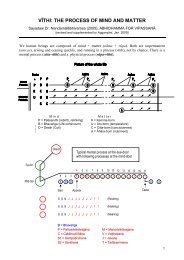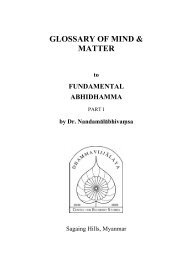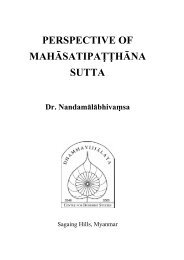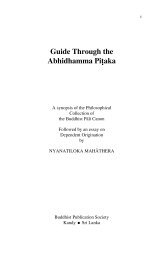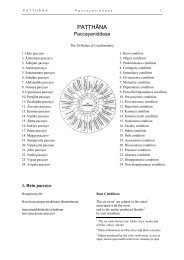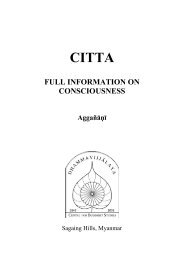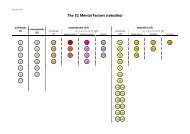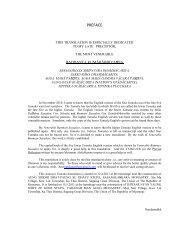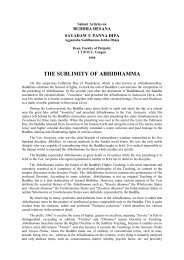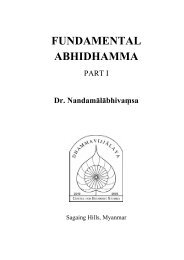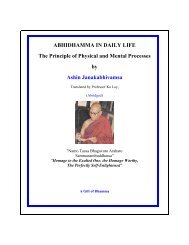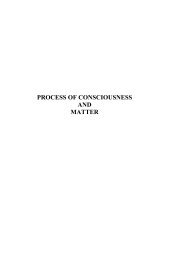Mahathera Ledi Sayadaw - Abhidhamma.com
Mahathera Ledi Sayadaw - Abhidhamma.com
Mahathera Ledi Sayadaw - Abhidhamma.com
You also want an ePaper? Increase the reach of your titles
YUMPU automatically turns print PDFs into web optimized ePapers that Google loves.
In Buddhist philosophy there are three things which are "eternal and immortal", in the sense in<br />
which that phrase is here used in the text. These three things are called in the Pali, pannatti<br />
(plural, pannattiyo), akasa, and nibbana, that is: Concepts (or ideas), Space and that which<br />
supervenes when Craving, Hate and Delusion are <strong>com</strong>pletely wiped out. Of these three things it is<br />
held that their existence is something which has nothing whatever to do with time, never enters<br />
time, is never limited by time. The law of Rise-and-fall, of arising and ceasing, which applies to<br />
all things else, does not apply to them. They exist independent of whether any particular being<br />
thinks them or not. In other words: they are eternal and immortal and independent of time, not in<br />
any sense of being unbrokenly continuous in time. Nibbana is distinguished from the two other<br />
"eternal and immortal" things in that it has Santilakkhana or it is Santibhava, a word which may<br />
be rendered quite accurately in English (if not literally, at least in accord with its spirit) as "The<br />
Great Peace" and all that this implies. (Trb,) But in the ideas (pannatti) of persons and creatures<br />
no marks of Viparinama and Annathabhava are to be seen. lf such marks were to be found in the<br />
ideas (pannatti) of persons and creatures, then, of course, the ideas of Pannattiyo would also be<br />
subject to births, decays, and deaths, and would be reborn and decay and die many times even in<br />
one day. But these marks are not to be found in the Pannatti or ideas; we discern these marks only<br />
in the mental and material phenomena. Therefore it <strong>com</strong>es to this, that the mental and material<br />
phenomena, that is, Nama-rupa- dhamma are not to be regarded as the essence or substantiality of<br />
persons and creatures. It is in this way that the mark of "No-soul" be<strong>com</strong>es the mark of<br />
impermanence, in accordance with the Text: "Asarakatthena anatta," or, "On account of being<br />
without a core, the word Anatta is used."<br />
How does the mark of Ill be<strong>com</strong>e the mark of Impermanence The marks of Ill are very evil, very<br />
disadvantageous, and very unsatisfactory; and all creatures desire to be in good states, to be<br />
prosperous, and to be satisfied. If mental and material phenomena are the true essence of persons<br />
and creatures the phenomena and the person must be one and the same. And if this be so, their<br />
desires must also be one and the same; that is, the person's desire must also be that of the<br />
phenomena, and vice-versa. But if this is not so, then each must be a thing separate from the<br />
other. Here by "person's desire" we mean Greed (lobha) and Desire-to-do (chanda) and by "the<br />
desire of phenomena," the happening of things in accordance with their cause. A main<br />
characteristic of persons and creatures is the craving for happiness of mind and body; and an<br />
outstanding feature of phenomena is their uniformity with their causes or conditioning things: that<br />
is, the arising and the ceasing of phenomena are subject to causes, and never entirely in<br />
accordance with the desires of persons in defiance of causes. For example: if warmness is wanted<br />
the cause that produces warmness must be sought out; or if coldness is wanted, the cause that<br />
produces coldness must be sought out. If long life is wanted, the conditioning cause, a supply of<br />
suitable food daily, must be sought out; for no man can live long merely by wishing to live long.<br />
And if rebirth in the worlds of the Fortunate is wanted, then the cause of this, moral or virtuous<br />
deeds, must be sought out; for no one can get to the worlds of the Fortunate merely by wishing to<br />
be reborn there. It is sometimes erroneously thought or believed that one can be whatever one<br />
wishes to be, upon occasions when something one has wished for is later on fulfilled, although the<br />
actual fact is that it has <strong>com</strong>e about only in accordance with a cause that has previously been<br />
sought out and brought into play. It is falsely thought or believed by many people that one can<br />
maintain oneself according to one's wish when in sound health or at ease in any of the four bodily<br />
postures, ignoring the fact that the cause, the partaking of food on previous days, was sought out<br />
by them and brought into play. They also mistakenly think that their wishes are always fulfilled,<br />
when they find themselves living happily in buildings previously in existence. But in truth, if one<br />
looks about him in this world and sees how great and how numerous are the businesses affairs,<br />
occupations and so forth, of men in all their extent and variety, he will soon discern with the<br />
mind's eye that the Sankharadukkha, the Dukkha associated with the Sankharas, is great and<br />
manifold in precisely the same measure as men's activities. And this Dukkha is due to the<br />
begetting or the establishing of the causes necessary to the acquiring of the effects desired; for the<br />
phenomena can never be<strong>com</strong>e exactly all that beings may wish them to be, or may give orders<br />
that they are to be. Thus simply in beholding the marks of Sankharadukkhata all about us, it




